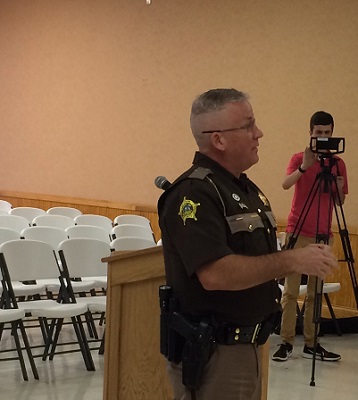
In response to questions he’s received from citizens on the small size of his staff, Sheriff Norman Chaffins highlighted the personnel struggles his office has experienced in a presentation to Fiscal Court on Tuesday.
“The comment was made and the question was asked of me after my second year in office, ‘Sheriff, you sure do have several deputies going to other agencies or quitting on you; what is the problem, why can’t you keep people?’ Chaffins said. “I cannot possibly answer that question without sharing some information with you first.”
Comparing Grayson County Sheriff’s Office to SOs in counties with similar populations
The Grayson County Sheriff’s Office (GCSO) currently has seven full-time and one part-time deputy, and one Greater Hardin County Narcotics Task Force member. The GCSO has zero school resource officers (SRO) and detectives.
The starting pay for deputies in Grayson County is $12 per hour, which increases to $13 per hour upon graduation from the police academy. That equates to about $26,520 per year based on working 40 hours per week for 51 weeks (Grayson County deputies do not receive overtime pay).
Grayson County’s 2018 population estimate was 26,321, Chaffins said, and “our deputies cover about 511 square miles of land and over 715 miles of road to patrol (Grayson County is 11th out of 120 counties in land size).”
Over the last four-plus years, the GCSO has experienced and continues to experience an inordinate amount of turnover among its deputies, with many of the deputies leaving due to a heavy workload and a corresponding lack of desirable pay. This has led to occasionally delayed response times and (sporadically) having only one deputy on duty, which becomes an officer safety issue in an increasingly dangerous job.
Chaffins cited several examples of similarly sized and nearby counties paying its deputies considerably more money:
- Allen County – Population 20,628, number of road deputies 12, two SROs, starting pay $15.92 per hour ($32,476 per year).
- Grant County — Population 24,800, number of road deputies 17, two SROs, starting pay $16 per hour ($32,640).
- Perry County – Population 27,389, number of road deputies 11, eight SRO’s, one detective, starting pay $14 per hour then increases to $17.65 upon graduation from academy ($36,006).
- Rowan County – Population 24,392, number of road deputies 12, two SRO’s, one detective, one task force detective, starting pay $15 per hour ($30,600).
- Butler County — Population 12,735, number of road deputies eight full-time and two part-time, two SROs, starting pay $15 per hour then to $16.50 upon graduation from the academy ($33,660).
- Ohio County – Population 24,062, number of road deputies 12, one detective, one task force member, starting pay $13 per hour then to $17 per hour upon graduation from the academy ($34,680).
- Leitchfield PD – Population 7,000, number of full-time officers 23, one detective, starting pay $13 per hour with a .50 cent raise every year (LPD covers about 10 square miles).
Increasing workload
Chaffins noted his office’s increased work load from 2017 to 2018, evidenced by the number of arrests, papers served, wrecks worked, and other pertinent data:
- 2017 — 4,215 paper attempts, 1,688 papers served, opened 126 criminal cases, made 625 arrests, arrested 67 DUI drivers, wrote 1,060 citations, answered 6,336 calls for service, conducted over 500 extra patrol requests (usually means a couple of trips through the requested area, depending on nature of complaint), worked 433 vehicle crashes, provided 303 motorists with assistance, and had 18,000-plus citizen contacts ((victims, witnesses, perpetrators, bystanders, programs, special details, etc).
- 2018 – 5,100 paper attempts, 2,040 papers served, opened 292 criminal cases, made 890 arrests, arrested 68 DUI drivers, wrote 1,297 citations, answered 8,659 calls for service, conducted 685 extra patrol requests, worked 505 vehicle crashes, 375 motorist assists, and had 21,000-plus citizen contacts.
“Is it becoming clearer as to why we are losing good deputies?” Chaffins asked. “Many of you have asked me, ‘What can we do to help?’ My answer is very simple; if you have ideas on how we can generate revenue to hire more deputies, let me know.”
Chaffins’ ideas to generate revenue
Chaffins, offering not only reasons for a shortage in deputies, also said he has a couple of ideas on how to generate revenue in order to hire more deputies, including:
- An impound lot for the sheriff’s office. Chaffins said Lt. Sonny Poteet is working on quotes to have a lot installed. Chaffins added that Bullitt County generates well over $120,000 per year for its sheriff’s office through managing its own lot.
- Require special deputies to work at least 40 hours of volunteer security on the lakes to generate additional revenue from the U.S. Army Corps of Engineers, the entity that pays the GCSO for patrolling the lakes.
Chaffins stated that his office is “doing what we can to save money every place we can.”
“Currently, we have one deputy that is looking to go elsewhere because his wife is losing her insurance and many other agencies offer family insurance at an affordable rate,” Chaffins said. “He would essentially pay the county to work as a deputy if he was to get family insurance. Another deputy is looking to go to the (Louisville) airport. Now, I don’t expect to compete with the salary they offer (in the $50k to $60k per year range), but I also refuse to accept that this is always the way it’s going to be.”
Multiple times during Chaffins’ presentation he said he is not asking for an increased budget or pointing fingers, only supplying answers to questions he continues to receive regarding the size of his force. He also said he is not blaming the current Fiscal Court for the predicament he and the county are in due to a lack of pay for deputies. In fact, he said his presentation on Tuesday was the first time he’s been allowed to speak to magistrates about these issues since he was elected sheriff in November 2014 (Chaffins took office on January 1, 2015).
While no decisions were made by Fiscal Court on Tuesday on how to remedy the situation, magistrates appeared to be willing to work together with Chaffins to find a resolution to this issue.
(Photo: GC Sheriff Norman Chaffins talking to magistrates at Tuesday’s Fiscal Court meeting)
By Ken Howlett, News Director
Contact Ken at ken@k105.com or 270-259-6000








